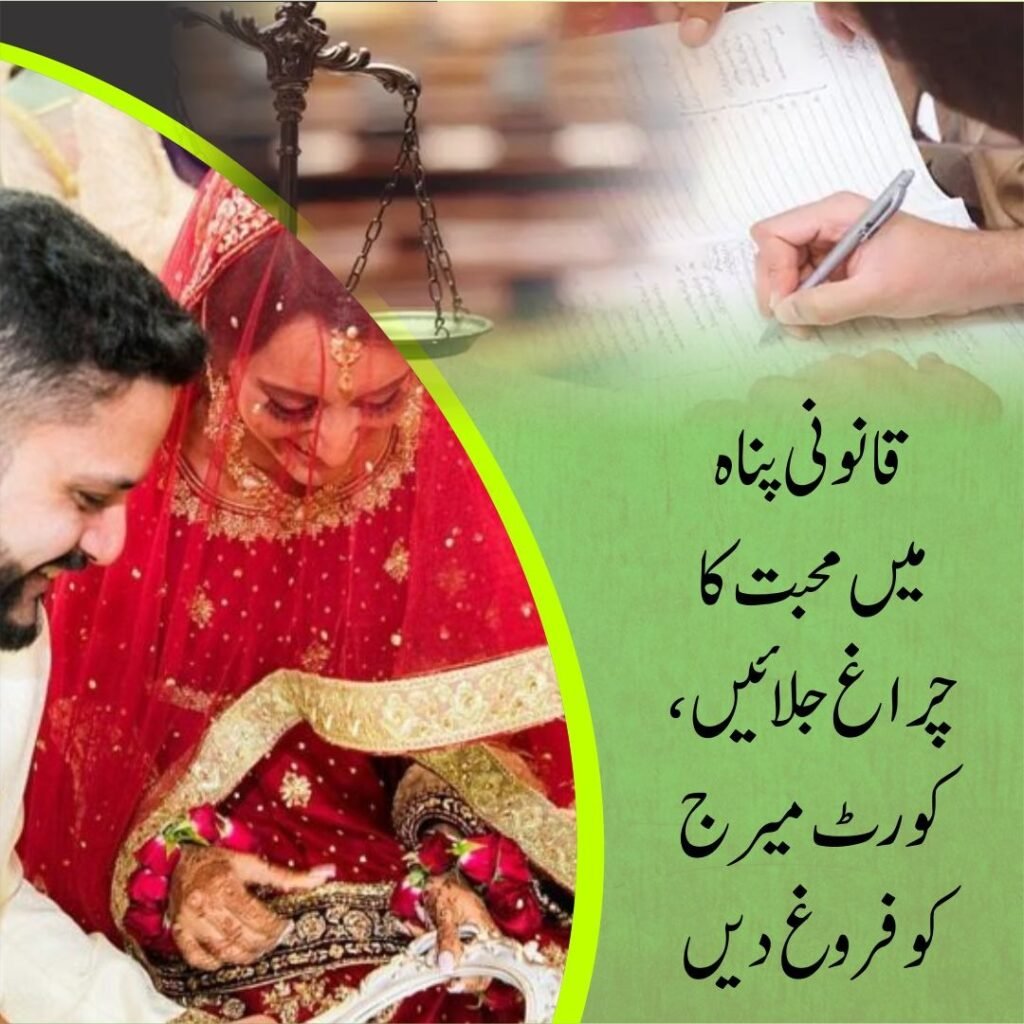Court Marriage Procedure and Fees in Pakistan | Law Firm
Court Marriage Procedure in Pakistan: Practical Choice for Legal Recognition
The Family Courts Act of 1964 plays a crucial role in regulating court marriages in Pakistan, serving as the legal foundation that ensures these unions are conducted with transparency, fairness, and respect for the rights of all parties involved. This landmark legislation established specialized family courts across the country, designed to handle matrimonial disputes and issues related to family law, including court marriages, the Family Courts Act of 1964 is the backbone of court marriage in Pakistan, offering a robust legal structure that ensures these unions are conducted with integrity and fairness, and providing couples with the legal protection they need to build a future together.
Court Marriage in Pakistan: A Cost-Effective Alternative to Traditional Weddings
The trend toward court marriages has gained momentum in recent years for several reasons. Firstly, it offers a streamlined and efficient way to marry, cutting through the elaborate and often expensive traditional wedding ceremonies. Couples who prioritize a straightforward and budget-friendly approach find court marriage particularly appealing. Additionally, court marriages provide legal protection and documentation that ensures the marriage is recognized by the state, which can be pivotal for various legal and administrative purposes.

How Court Marriage in Pakistan Promotes Equality and Privacy?
Furthermore, court marriages are considered more inclusive as they allow individuals from different religious or cultural backgrounds to marry without the need for conversions or adherence to specific cultural rituals. This inclusivity is a significant factor in the growing preference for court marriage in Pakistan, as it aligns with the values of privacy, equality, and mutual consent.
Personal Choice and Autonomy in Court Marriage in Pakistan
The rise in popularity of court marriage also reflects changing societal norms and attitudes towards marriage in Pakistan. There is a growing acceptance of personal choice and autonomy in marital decisions, leading to an increase in couples opting for civil ceremonies over traditional ones. This shift is indicative of a broader societal move towards modernity and individualism.
How Court Marriage in Pakistan Ensures Inclusivity and Legal Adherence
Court marriage in Pakistan is a legally binding procedure, accessible to all individuals regardless of their religion, caste, or creed. The process is straightforward and involves several critical stages. The ceremony is typically presided over by an authorized judicial officer or a Marriage Registrar, ensuring that all legal formalities are meticulously observed.
Step-by-Step Guide to Court Marriage Documentation in Pakistan
The initial step towards solemnizing a court marriage in Pakistan involves preparing the necessary documentation. Both parties are required to provide their National Identity Cards (CNIC) for identity verification. Additionally, four passport-sized photographs of each individual are mandatory. Proof of address, along with a copy of the CNIC of two witnesses, who are required to be present during the marriage ceremony, is also essential.
Application Submission Process for Court Marriage in Pakistan
Following the preparation of documents, a marriage application must be submitted to the Marriage Registrar or the relevant court official. Usually, this involves filling out a prescribed form where the details of the bride, groom, and witnesses are recorded. This form serves as the primary document for legalizing the marriage.

The Importance of Affidavits in Court Marriage in Pakistan
The next phase involves the submission of an affidavit by the female, affirming their willingness to marry each other voluntarily. This affidavit is a crucial part of the process as it ensures that the marriage is conducted without any external pressure or coercion. Once the affidavit is submitted, the court official will verify all documents and schedule a date for the marriage ceremony.
The Role of the Nikah Nama in Court Marriage in Pakistan
On the designated date, in the presence of the court official and witnesses, the marriage is solemnized. The Marriage Registrar or judicial officer administers the Nikah Nama (Marriage Certificate), which both parties and their witnesses must sign. It is also essential that the bride and groom declare their consent to the union three times in the presence of the official to solidify the marriage contract.
Official Registration of Nikah Nama in Court Marriage in Pakistan
Finally, post-solemnization, the Nikah Nama is registered officially, and a copy is provided to the newly wedded couple. This registered document serves as undeniable proof of their marital status and is essential for any future legal proceedings or formalities. The entire process, although detailed, ensures transparency, legality, and mutual consent in every court marriage in Pakistan.
The Benefits of Court Marriage in Pakistan: Simplicity and Cost-Effectiveness
In Pakistan, court marriages are legally recognized and binding, offering an alternative to traditional wedding ceremonies. Court marriages allow couples to formalize their union under the law, which is particularly beneficial for those seeking a straightforward, cost-effective process. However, it is essential to understand the legal requirements and prerequisites involved in solemnizing a court marriage in Pakistan.

Court Marriage Legally Age Required in Pakistan
Firstly, both parties must meet certain age criteria. According to Pakistani law, the minimum age for marriage is 18 years for males and 18 years for females. However, it is crucial to note that the legal age requirements can vary depending on provincial laws. For example, in Sindh, the legal age for marriage is 18 years for both males and females.
Legal Documentation for Court Marriage in Pakistan: What You Need to Know
There are specific documentation requirements. The parties need to submit their national identity cards (CNICs) or a valid form of identification. If one or both parties were previously married, proof of dissolution of the previous marriage, such as a divorce decree or death certificate of the former spouse, must be provided. This ensures that no pre-existing marriages hinder the court marriage process.
Minimum Witnesses Needed for Court Marriage in Pakistan
Witnesses play a critical role in the proceedings. Typically, a court marriage in Pakistan requires the presence of at least two male witnesses or one male and two female witnesses to attest to the union. The witnesses should also present identification documents to verify their identity.
Finalizing Your Court Marriage in Pakistan: Visiting the Union Council
Lastly, the couple must visit the local union council or the office of the marriage registrar to complete the registration process. This may involve filling out forms, swearing affidavits, and paying the applicable fees determined by the local governing body.

Essential Steps for a Smooth Court Marriage Application in Pakistan
The application process for court marriage in Pakistan is straightforward but requires meticulous attention to detail to ensure the submission of all necessary documents. Individuals seeking to solemnize their court marriage are advised to gather the essential paperwork before initiating the process to avoid any delays or inconveniences.
Court Marriage in Pakistan: How to Fill Out the Marriage Application Form?
Firstly, both parties intending to get married must fill out a marriage application form, available either online or at the local Union Council office. This form requires basic personal details such as names, ages, and addresses. Upon completing the form, both applicants must sign it in the presence of a judicial officer or a marriage registrar. Once the form is verified, it should be submitted to the appropriate authority, often the Marriage Registrar’s Office, along with the requisite fee.
Court Marriage Required Documents in Pakistan
Several documents are obligatory for the court marriage process in Pakistan. These include:
- Computerized National Identity Cards (CNICs): Both parties must present their CNICs for identification verification purposes.
- Passport-sized Photographs: Recent photographs (typically four of each party) are required for record-keeping and official documentation.
- Affidavits of Free Will: Both the bride and groom must submit affidavits affirming that they are entering the marriage of their own free will and without coercion. These affidavits must be signed and attested by a Notary Public or an Oath Commissioner.
- Witnesses: The presence of at least two adult witnesses is essential during the signing of the marriage contract (Nikah Nama). Each witness must have their CNIC for verification.
- Dissolution of Previous Marriages: If applicable, documentation proving the dissolution of any prior marriages, such as a divorce decree or death certificate, must be submitted.
By following this structured process and ensuring the submission of all required documents, couples can efficiently navigate the legal formalities of a court marriage in Pakistan.
Duration and Cost of Court Marriage in Pakistan
The entire process of court marriage in Pakistan is fairly streamlined, ensuring that couples can formalize their union without excessive delays. Typically, the entire procedure from start to finish takes about two to three days. This timeframe includes the gathering of required documents, verification procedures, and the official ceremony. However, it is crucial to note that this duration can vary depending on local administrative efficiency and any unforeseen bureaucratic hurdles. Couples should always plan for potential delays, which can be caused by incomplete documentation or high demand at the concerned offices.
Budgeting for Court Marriage in Pakistan: Fees
When it comes to costs, court marriages in Pakistan are generally more affordable compared to traditional wedding ceremonies. The primary expenses include administrative fees for documentation, which can range from PKR 15,000 to PKR 25,000. Legal services are another significant cost factor, with lawyers typically charging between PKR 20,000 to PKR 50,000, depending on their experience and the complexity of the case. It is advisable to consult multiple legal professionals to get a clear understanding of the fee structures involved.
Additional Financial Considerations for Court Marriage in Pakistan
Additional costs to consider include the issuance of the marriage certificate or ‘Nikah Nama,’ which may incur a nominal fee. Some courts also require the presence of witnesses to attest to the marriage, which might involve minor expenses if these individuals expect remuneration for their time. Furthermore, although not mandatory, some couples choose to have a modest ceremony to mark the occasion, adding to the overall cost.

Court Marriages Benefits and Differences from Traditional Marriage
Choosing a court marriage in Pakistan offers numerous advantages over traditional marriage ceremonies. One of the most significant benefits is its simplicity. Unlike traditional marriages, which often require extensive preparations, guest lists, and elaborate events that span several days, court marriage is a streamlined process. This simplicity can substantially reduce the stress often associated with planning a wedding.
The Advantages of Court Marriage in Pakistan Compared to Traditional Marriages
Another notable advantage is cost-effectiveness. Traditional marriages in Pakistan can be financially burdensome due to the expenses involved in hosting large gatherings, arranging multiple ceremonies, and meeting cultural expectations. In contrast, a court marriage typically involves minimal costs, covering only essential legal fees and documentation requirements. This budget-friendly approach can be particularly appealing to couples who prefer to allocate their resources to other life priorities.
Court Marriage in Pakistan: A Private Alternative to Public Weddings
Privacy is another compelling factor. In a country where weddings are considered social events with sizeable attendance, a court marriage provides the couple with the opportunity to solemnize their union without public scrutiny. This aspect of privacy ensures that the occasion remains an intimate affair shared only among close family members and friends if desired.
The Privacy Advantage of Court Marriage in Pakistan
Efficiency stands out as a practical advantage of court marriage. The procedures involved are straightforward, and the time required is relatively short. This efficient process contrasts sharply with traditional wedding preparations, which can stretch over months. For couples interested in expediting their marriage formalization, court marriage presents a swift alternative.
Traditional vs. Court Marriage in Pakistan: Balancing Culture and Pragmatism
Comparing the two, traditional marriages in Pakistan are culturally rich events steeped in rituals and traditions. They play a vital role in community and family bonding, offering a sense of continuity and celebration. Conversely, court marriages favor pragmatism and personalization. The decision ultimately boils down to individual preferences, each type of marriage offering a unique set of advantages.
Special Considerations for Court Marriage in Pakistan
Court marriage in Pakistan offers a streamlined, legally recognized alternative for couples who prefer a more straightforward process than traditional wedding ceremonies. However, certain considerations must be taken into account to ensure the smooth execution and subsequent recognition of the marriage.

Accessibility and Inclusivity: Court Marriage in Pakistan for All Couples
Accessibility for all couples, including those in interfaith or cross-cultural relationships, is one of the foremost advantages of court marriage in Pakistan. The legal framework guarantees equal rights and protection under the law, making court marriage an appealing option for couples who may face societal or familial opposition. Also, given the legal backing, the marriage is recognized by all Pakistani jurisdictions.
Legal Requirements for Foreign Nationals Seeking Court Marriage in Pakistan
For foreign nationals looking to marry in Pakistan, the process is also accommodating, provided they meet local legal requirements. These include obtaining a No Objection Certificate (NOC) from their respective embassies and ensuring all documentation is verified. This inclusivity demonstrates Pakistan’s commitment to protecting the rights of all individuals and promoting lawful marriages.
Maintaining Privacy in Court Marriage: A Key Advantage in Pakistan
Privacy is a significant concern for many couples, and court marriages provide a level of discretion not always attainable through traditional ceremonies. The proceedings are conducted within judicial premises, away from public scrutiny, which can be invaluable for individuals desiring limited exposure and for those in sensitive situations.
Overcoming Social Obstacles in Court Marriage in Pakistan
Despite its benefits, there are notable challenges associated with court marriages. Societal and cultural norms may present hurdles, especially in more conservative regions where traditional marriages receive overwhelming preference. Couples may encounter social stigma, familial estrangement, or community backlash the legal process, although straightforward, is devoid of the cultural customs and rituals that many families value, potentially causing interpersonal conflicts. In summary, court marriage in Pakistan offers a legally sound, private, and inclusive option for couples from diverse backgrounds. However, it is essential to weigh these benefits against potential societal and cultural challenges to make an informed decision.
Court Marriage in Pakistan Unveils a Modern Legal Framework That Facilitates Couples
The journey through the intricacies of getting a court marriage in Pakistan unveils a modern legal framework that facilitates couples aiming for a legitimate, streamlined, and private matrimonial union. This guide has detailed the prerequisites, procedural steps, and advantages of opting for a court marriage as opposed to traditional, arranged marriages. While both forms of matrimonial unions hold cultural and societal significance, court marriages are increasingly seen as a pragmatic option in urban areas.
The Growing Popularity of Court Marriage in Urban Pakistan
In contemporary urban Pakistan, the trend of court marriage is steadily gaining traction. This shift can be attributed to changing societal norms, increased education levels, and a growing emphasis on individual autonomy. While arranged marriages continue to be predominant, particularly in rural regions where traditional values are strong, court marriages offer a viable alternative for those seeking to prioritize personal choice and mutual consent.

The Role of Social Attitudes in Court Marriage in Pakistan
Social attitudes play a critical role in shaping one’s decision to opt for court marriage. Although legal acceptance is robust, societal perceptions can vary significantly. Families and communities may harbor reservations based on deeply entrenched cultural beliefs. Consequently, couples considering court marriage should engage in open communication with their families to address potential concerns and seek support.
Practical Tips for Court Marriage in Pakistan: Documentation and Legal Guidance
Practical advice for couples considering a court marriage in Pakistan includes ensuring thorough documentation and understanding the legal requirements. It is also wise to seek counsel from legal professionals to navigate through the legalities smoothly. Emotional preparedness and mutual understanding are equally crucial, as societal pressures can, at times, be challenging.
Urban Trends: Why Court Marriage is Gaining Traction in Pakistan
Court marriage in Pakistan represents a synthesis of modern legal provisions and evolving social dynamics. As this trend continues to grow, it symbolizes a shift towards more empowered and consensual matrimonial choices, reflecting broader progressive changes within urban societies.
BLOG BY UZAIR REHMAN
Some Useful Links of the Top Court Marriage Sites in Pakistan
- Court Marriage Procedure
- Court Marriage in Pakistan
- Family Lawyers For Court Marriage
- Court Marriage & Online Shadi
- Court Marriage Rules
- Court Marriage in Islamabad
- Court Marriage Law
- Court Marriage Process
- Court Marriage Rawalpindi
- Court Marriage Nikah Nama
- Court Marriage Live
- Court Marriage-Civil Marriage

